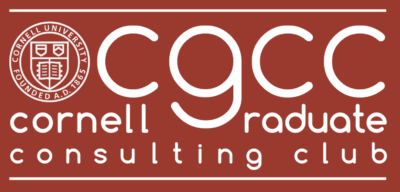Case Competition Tackles Real World Problem

The Cornell Graduate Consulting Club (CGCC) is a very active graduate student-run organization that helps grad students and postdocs explore and practice the principles of consulting. It is led by doctoral students Eilis Mohanan (Near Eastern studies), Fiona Harnishfeger (food science), Rick Wang (biomedical engineering), Sylvia Zhang (biomedical engineering) and master’s students Marcell Fischler (M.P.A.), Carter Weis (A.E.M.), and Ashley Krupa (M.H.A.) and is advised by Chris Schaffer, professor (biomedical engineering). The club holds regular events on Consulting 101, CVs and resumes, and case competitions to learn more about a career in strategic, technical, or management consulting. But they also regularly invite alumni and other experts to talk specifics about managing client expectations, case competition experiences, and bridging the gap to connect with M.B.A.s. As a result of social events where they seek input on programming ideas, the group decided to hold their own case competition right here at Cornell in Ithaca. What follows is their story about a recent case competition they organized:
For the theme of the case competition we decided to focus on sustainability and partner with Cornell Transportation Service to develop a prompt tasking teams to come up a new campus circulation transportation system. We wanted to give the teams the chance to tackle a real-world problem, especially one that impacts the campus community. The goal of the new circulation system that teams were tasked to develop is to facilitate travel within campus for diverse populations – faculty, staff, students living on campus, students living off campus, commuters, and also campus visitors.
Teams had two weeks to develop their solutions and four teams were selected to present their solutions in front of judges from the S. C. Johnson Graduate School of Management, Cornell Transportation, and TCAT. Presentations from the teams featured investigation of limitations of the current campus circulation system, creative solutions, and the associated financial and social impacts they will have on the Cornell community.
After the case competition, we have received feedback from the judges on how they enjoyed hearing the solutions and how they appreciated the opportunity to engage Cornell students in creating a solution that moves campus mobility forward. Teams also expressed their appreciation to have an opportunity to tackle a tangible, real-world consulting problem. Many of them told us that the competition was a great learning experience that polished their problem-solving skills under time pressure.
As a young organization, CGCC also benefited tremendously from organizing this case competition. In this process, CGCC gained invaluable knowledge in understanding the competition logistics that will prepare us to host inter-school case competitions in the future.
At the end, we can’t thank enough for all the support we had from numerous groups inside and outside of Cornell such as Cornell Transportation Service, Careers Beyond Academia/BEST, TCAT and the S. C. Johnson Graduate School of Management. Without their help, CGCC would not be able to host the competition successfully.
The case competition was hosted by the Cornell Graduate Consulting Club. This article was written and edited by its members.
Related News: TCAT flattens fare structure to benefit rural riders


